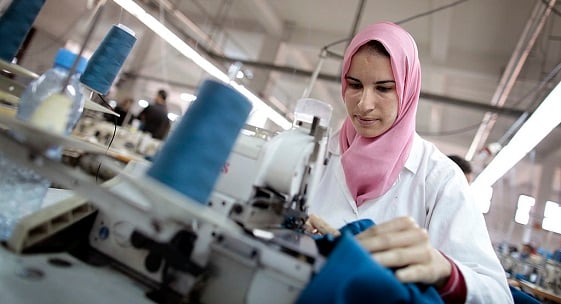
An employee sews a garment at a textile factory in Tangier, Morocco. Policies that promote more women in the workforce can benefit the economy, says the IMF (photo: Thomas Koehler/Photothek via Getty Images)
Morocco: Reducing Gender Inequality Can Boost Growth
March 1, 2017
Related Links
Policies that better integrate women into the economy could help increase overall income and significantly improve Morocco’s growth prospects, IMF study finds.
Jamila is a 12-year-old girl living in rural Morocco. She is still in school when most girls her age are not—about 78 percent of girls between the ages of 12 and 14 are no longer in formal schooling in the country’s rural areas. Her dream is to become a doctor, and if she stays on track with her education she should be able to accomplish this goal.
But significant challenges stand in Jamila’s way—a slowing economy over the past five years, limited job opportunities (22 percent youth unemployment), and fewer women in the workplace as compared to men (25 percent participation rate compared to over 66 percent).
The government has started to implement policies that better integrate women into the economy, but more still needs to be done to help young girls like Jamila achieve their dreams.

Women and the economy
As part of the assessment of Morocco’s economy, we looked at the relationship between gender inequality and growth and found that policies that better integrate women into the economy could significantly improve the country’s growth. For instance, if there were as many women working as men currently are in Morocco, income per capita could be almost 50 percent higher than it is now.
Furthermore, Morocco’s population growth is slowing, and the United Nations projects that the dependency ratio—the age population ratio of those out and in the labor force—will rise by 2040. This means that there is a potential for more people to be out of work over the next few decades. Continuing to implement policies that eliminate gender gaps—such as increasing access to education and improving public transportation (making it safer and easier to get to work) for women, vocational training and literacy programs for rural areas—could offset these negative effects.
Improving women’s rights
The government has already initiated the following steps:
-
The family code was revised to expand the rights of women in marriage, guardianship, child custody, and access to divorce in 2004.
-
A constitutional guarantee for equality was enacted in 2011.
-
Maternity leave of 14 weeks at full salary was introduced in 2004.
-
The first and most advanced gender budgeting initiative in the Middle East and Central Asia region was launched in Morocco in 2002. Gender budgeting uses fiscal policies and administration, at the national, state, or local level, to address gender inequality and women’s advancement.
.jpg?h=611&w=400&hash=ACA1A9D06000A503AEEC8A1C10096CF2539FCAFC&hash=ACA1A9D06000A503AEEC8A1C10096CF2539FCAFC)
More reforms needed
Even with these improvements, our research points out that stronger and better targeted measures are needed to increase female labor force participation and employment, and to address gender gaps in education in Morocco.
For instance, our study found that:
-
Investing in public childcare facilities could free women’s time, enabling them to undertake more educational and training activities, and join the labor market.
-
Tax deductions or credits are currently only available to men, who as taxpayers are able to claim a dependent deduction for both spouse and children. A female taxpayer may not claim similar tax advantages unless she proves that she is a legal guardian.
- Conditional transfer programs for education, as recommended in the recently-adopted national employment strategy, can promote better access to secondary education for girls. The transfer programs could also support literacy programs for women in rural areas, female entrepreneurship, and vocational training programs for all women.
If all these actions are implemented, there is no doubt that the barriers to Jamila’s economic participation would be greatly reduced, and she would have more opportunities to contribute to a more prosperous and inclusive Moroccan society.


